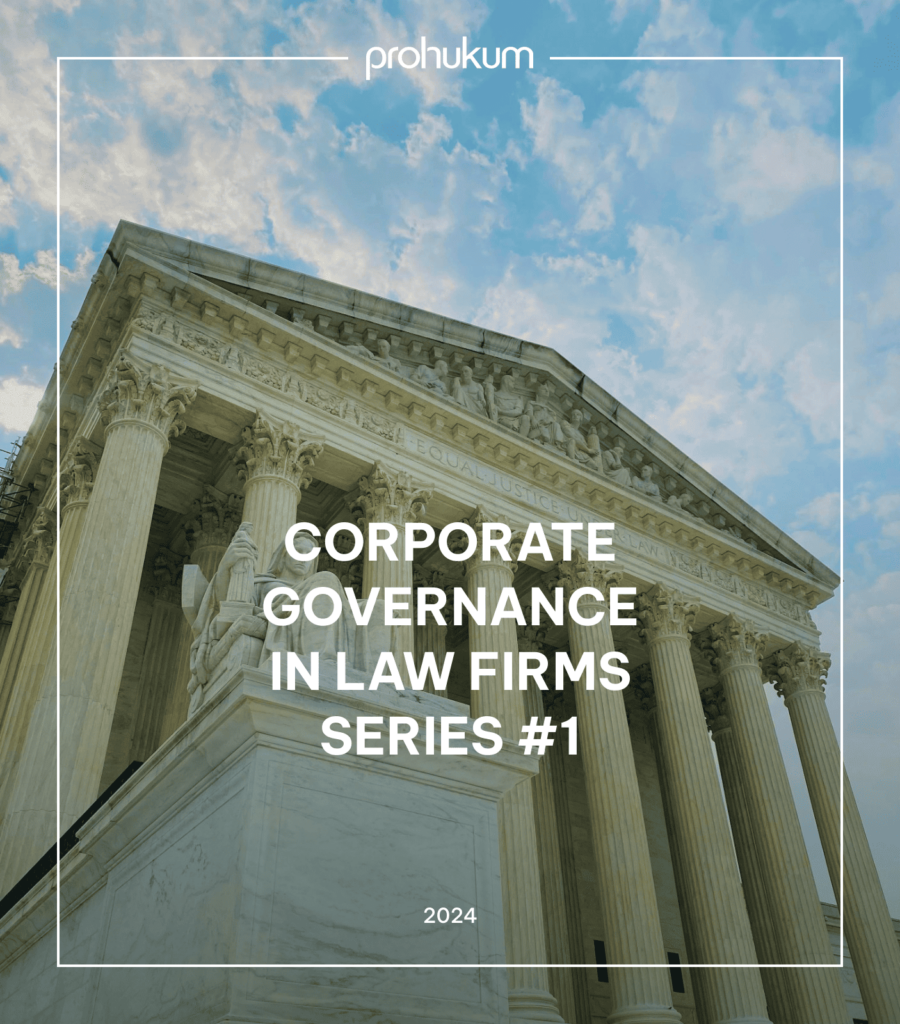In today’s competitive legal environment, establishing a strong foundation for sustainability and optimal performance is crucial for any law firm. By focusing on long-term strategic planning and operational efficiency, firms can ensure their growth and ability to meet client needs while maintaining high standards of legal service. Moreover, law firms with clear and structured governance systems can maintain integrity, enhance efficiency, and build better relationships with clients, employees, and other stakeholders.

This article will discuss how law firms can design and implement effective governance strategies to ensure their sustainability and optimize performance in addressing existing challenges.
Why Is Corporate Governance Important for Law Firms?
Corporate governance in the context of law firms involves decision-making processes that include management, oversight, and the distribution of responsibilities among shareholders (or firm owners), attorneys, and other staff. In addition, good governance ensures that the firm operates in compliance with applicable laws and provides a clear structure to improve performance and operational efficiency.
a. Enhancing Trust and Reputation of Law Firms
Trust is the main capital in the legal service business. As a result, clients entrust their legal issues to law firms, expecting professional and secure resolutions. Furthermore, by implementing good governance, law firms can demonstrate transparency in decision-making, maintain client confidentiality, and avoid potential conflicts of interest. This, in turn, not only strengthens the firm’s reputation in the eyes of clients but also among the public and regulators.
b. Reducing Legal and Reputational Risks
As entities responsible for resolving clients’ legal issues, law firms must ensure compliance with applicable regulations. In addition, good governance minimizes legal risks, such as violations of the legal profession’s code of ethics or information leaks that could harm the firm’s reputation. Moreover, clear governance also serves to identify and manage risks that may arise in daily legal practice.
c. Efficiency and Better Resource Management
Good governance directly correlates with resource management in a firm. In particular, efficient management of human resources (lawyers and staff), finances, and information technology can improve the firm’s overall performance. Furthermore, with organized systems and clear procedures, firms can reduce wasted time and costs, boost productivity, and deliver better services to clients.
Strategic Steps in Building Effective Governance in Law Firms
Building good governance in a law firm is not just about implementing administrative procedures. It is a strategic process that requires careful planning, commitment from all parties, and an understanding of governance’s role in the firm’s success.
Below are strategic steps for building effective governance in law firms:
a. Defining the Firm’s Vision, Mission, and Values
The first step in designing effective governance is defining the firm’s vision, mission, and values. In this regard, these serve as the primary guidelines for all firm elements in carrying out their activities. Moreover, a clear vision helps the firm have a well-directed long-term goal, while the mission reflects how the firm achieves those goals. Additionally, the firm’s values, including ethical principles and integrity, form the foundation for all decisions and behaviors within the organization.
b. Establishing a Clear Organizational Structure
A clear organizational structure is a key element of law firm governance. Proper arrangements between the firm’s owners, management, and lawyers help in the effective delegation of tasks and quick decision-making. A well-designed structure ensures transparency in the firm’s operations and helps everyone understand their role in achieving the firm’s goals.
c. Consistent Oversight and Performance Evaluation
One crucial aspect of governance is ongoing oversight of the firm’s performance. In this context, law firms need evaluation mechanisms to monitor each department’s and individual’s performance. Furthermore, effective oversight ensures that the firm stays on track to achieve its objectives. In addition, periodic evaluations allow the firm to identify areas for improvement and make better decisions for the future.
d. Transparent and Accountable Decision-Making Processes
Law firms must ensure that decision-making processes are transparent and accountable. In addition, lawyers and staff involved in decision-making should have a shared understanding of the firm’s objectives and applicable ethical guidelines. As a result, transparent processes help avoid conflicts of interest and facilitate better communication among team members.
e. Proactive Risk Management
Risk management is an essential aspect of any law firm. As providers of legal services, firms must identify potential risks associated with their practice, including legal, financial, and reputational risks. Governance strategies should include proactive measures to identify, assess, and mitigate these risks. Effective risk management ensures operational continuity and strengthens client relationships.
f. Technology and Information Systems Supporting Governance
The right technology can support the implementation of good governance. For instance, law firms can use case management software, secure document management systems, or other technological tools to manage information more efficiently. Moreover, technology also enables firms to improve oversight and ensure compliance with applicable regulations.
Challenges in Implementing Effective Governance
Despite its importance, implementing effective governance in law firms is not without challenges. In fact, some common challenges include:
- Limited Resources: Smaller law firms often face constraints in human and financial resources to implement comprehensive governance.
- Rapid Regulatory Changes: The legal world frequently encounters fast and dynamic regulatory changes. Law firms must adapt quickly to remain compliant with new and relevant rules.
- Closed Organizational Culture: Long-established law firms often have rigid organizational cultures. This can hinder the adoption of more modern and efficient governance procedures.
Conclusion: Building Sustainable and High-Performing Law Firms
Good governance is key to creating sustainable and high-performing law firms. In addition, by implementing effective governance strategies, law firms can enhance operational efficiency, reduce legal risks, and build better relationships with clients and other stakeholders. Furthermore, systematic steps focused on transparency, accountability, and effective risk management ensure that law firms can address challenges and thrive in the future.
